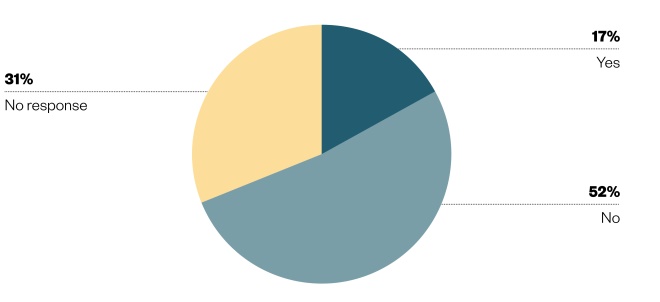
Shutterstock.com
Almost a fifth of local authorities in England decommissioned community pharmacy-led smoking cessation services in the past three years, The Pharmaceutical Journal has found.
A further 5% plan to decommission or reduce smoking cessation services in the next year and a fifth said that plans to decommission or reduce smoking cessation services in their area were yet to be finalised.
The Pharmaceutical Journal sent a freedom of information (FoI) request to all 152 local authorities in England asking about commissioning of smoking cessation services from community pharmacies across England following cuts to public health funding, announced by the government in June 2015.
A total of 125 of the local authorities in England responded to the request, although not all answered every question asked.

Question: Do you currently commission smoking cessation services from community pharmacies in your area?
Source: FoI / The Pharmaceutical Journal

Question: In the last three years, have smoking cessation services been decommissioned from community pharmacies in your area?
Source: FoI / The Pharmaceutical Journal

Question: Are there any plans to decommission, or reduce, smoking cessation services in your area in the next 12 months?
Source: FoI / The Pharmaceutical Journal
Of those who responded, 78% said that if a smoking cessation service were to be commissioned it would be their responsibility, but just 57% said that they currently commission smoking cessation services from community pharmacies.
Among the seven local authority areas in England with the highest smoking rates, according to figures from the Public Health England Local Tobacco Control Profiles, four saw a significant decrease in the value of smoking cessation contracts with community pharmacies between 2013–2014 and 2016–2017 and two had smoking cessation services decommissioned from community pharmacies altogether.

Top 10 increases and decreases in the annual value of local authority smoking cessation service contracts between 2013/14 and 2016/17
Source: FoI / The Pharmaceutical Journal
NB: Does not include activity-based contracts
Newham’s high smoking rate
The London borough of Newham has the third highest smoking rate in England, at 22.3% of the adult population, compared with the national average of 15.5%.
In this area, contracts for smoking cessation services are activity based, meaning that money is allocated by the local authority on the basis of the number of residents pharmacists have successfully managed to stop smoking. Between 2013–2014 and 2016–2017 there was a 71% drop in the amount of funding received by community pharmacies from the local authority in Newham.
The Local Tobacco Control Profile also showed that Newham had 300 successful quits at four weeks in 2016–2017, placing it seventh lowest out of all the local authority areas.
However, a Newham Council spokesperson said it was committed to encouraging as many of its residents as possible to lead smoke-free lives either by quitting cigarettes or not taking up the habit in the first place.
“Over the last four years more than 10,000 residents have been supported to stop smoking through the free help and advice provided by Newham Council working with local pharmacies and the Newham Clinical Commissioning Group”, they said.
Barnsley saw a 69% fall in the value of the local authority’s smoking cessation service contract with community pharmacies between 2013–2014 and 2016–2017, the second highest decrease in England. A spokesperson from the local authority said this was due to a reduction in the number of community pharmacies signing up to the scheme which has reduced from 15 pharmacies in 2013–2014 to just 8 or 9 in subsequent years.
“This could be for a number of reasons, including capacity of staff to do one-to-one appointments, availability for staff to access training or the merger or close of a pharmacy,” they said.
The lowest number of successful quits at four weeks in 2016–2017 was in Havering, where just 11 successful quits were achieved. Responses to The Pharmaceutical Journal’s FoI revealed that smoking cessation services have been decommissioned in Havering in the years since 2013–2014.
Hertfordshire achieved the third highest number of successful quits at four weeks (3,682) in 2016–2017. Hertfordshire local authority said it commissioned 155 individual community pharmacies to deliver smoking cessation services, the largest number of pharmacies in any local authority area, although the value of the local authority’s smoking cessation service commissioning contract with community pharmacies fell by 50% between 2013–2014 and 2016–2017.
Lowest smoking rates in England
The lowest smoking rate in England was in Harrow, where just 7.4% of the adult population smoked in 2016. Harrow Council said that in March 2017 it ceased funding of all stop-smoking services and tobacco control and said there were no plans to commission any smoking cessation services in the foreseeable future.
A spokesperson for Harrow Council said there were “many complex reasons” behind its decision to end stop-smoking services in Harrow, but that the main reason was funding.
A report produced by the council following a two-month public consultation in 2016 acknowledged that ending its stop smoking and tobacco control services might lead to increasing health inequalities in the borough but highlighted that ceasing the service would generate a saving of £279,000.
“The consultation revealed the alternative ways that our residents would be able to access support to stop smoking after our service ceased,” said the spokesperson.
In South Gloucestershire, just 9.7% of the population smokea, and the FoI revealed that the smoking cessation contract with community pharmacies in this area had increased by 71% between 2014–2015 and 2016–2017.
Public health cuts
Variation and declines in public health services have been attributed to the 6.2% cuts to the public health budget, announced by the government in June 2015 as part of measures to cut overall government spending in the UK.

Question: Do you commission smoking cessation services to be delivered from another provider, other than a community pharmacy? If so, which type?
Source: FoI / The Pharmaceutical Journal
Alastair Buxton, director of NHS services at the Pharmaceutical Services Negotiating Committee, said that the squeeze on budget was clearly having a detrimental impact on the provision of public health services to local communities, including those provided by pharmacy teams.
“Within the past year we have noticed an increase in the number of public health services being decommissioned by local authorities, with smoking cessation services being the most affected,” he said.
“At a time when the future sustainability of the NHS is going to be determined by the success or otherwise of initiatives to prevent people developing long-term conditions, this seems particularly short-sighted,” he added.
A report released by Cancer Research UK and Action on Smoking and Health (ASH) on 15 January 2018 showed that cuts to the public health budget nationally have led to dramatic changes in services for smokers[1]
. The report said that only 61% of local authorities continue to offer all local smokers access to evidence-based support in line with NICE guidance, and that there is now at least one local authority in England where there is a no budget at all for smoking cessation.
According to ASH, smoking costs the NHS in England approximately £2bn a year for treating diseases caused by the habit.
References
[1] Action on Smoking and Health and Cancer Research UK. Feeling the heat: The decline of Stop Smoking Services in England - findings from a survey of Local Authorities with public health budgets. Available here: http://ash.org.uk/download/feeling-heat-decline-stop-smoking-services-england/ (Accessed January 2018)


